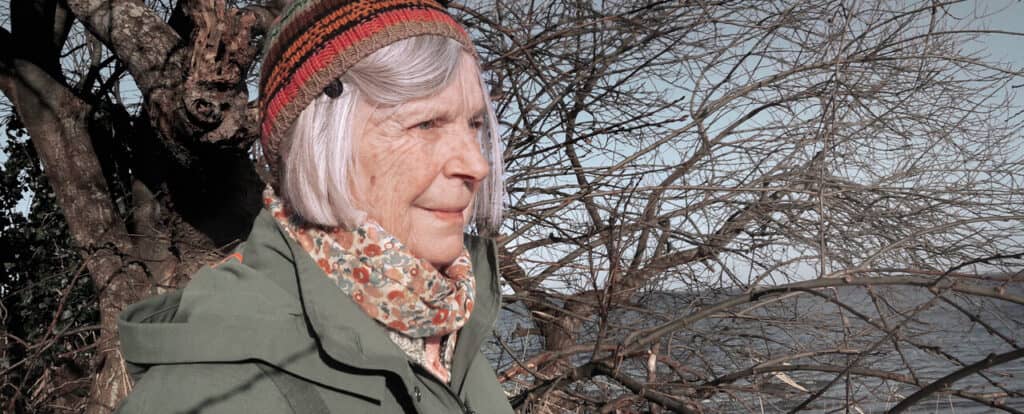- Coffee with
“The soil belongs to everyone.”

Barbara Beiertz
Coffee is a wondrous catalyst for conversations. It inspires. Opens the mind, the heart (and the mouth), and bridges differences.
Of course, I know all that. And yet, I am amazed once more, by how personal, intimate, and close a “coffee with…”sometimes gets. Like last year, when I had the pleasure (and I really mean that) to speak with Maritta Stille, the founder of the Aktion Kulturland foundation.
This resolute, smart, and gentle woman does not like to be centered, even though she is initiator of the foundation and used to be its engine and driving force for years. But of course, I keep my promise to not share those parts of the interview here, that were rather private. That’s why for once, we are not publishing the complete interview – with this brave lady, who already in the late 80s, managed to combine ecological agriculture, nature conservation, and social, cultural development.
But let’s start from the beginning:
We are sitting in a small, idyllic shed somewhere in the countryside near Angeln, close to the Baltic Sea. The rain is pattering on the glass roof – very typical conditions für northern Germany – and I am trying to understand the principle behind the Aktion Kulturland foundation:
The basis are Rudolf Steiner’s theses:
Soil, labor, and production capital are excluded from the market development and distributed and used by self-managed entities, in order to free the social system from its disastrous tensions.* (translated freely)
What is meant by that?
• The soil belongs to everyone. Each human being is entitled to the same share of ground surface. In a quite striking, 3-minute-video called “Das persönliche Feld” (Freely translated: The personal field)**, Eckart von Hirschhausen expresses a similar thought, including its consequences.
• The exploitation of soil should be of public utility. Meaning, the focus is on ecological agriculture, nature conservation, and community collaboration. And not on individual economic interests like “Organic is hip, so let’s just switch to organic farming”.
• The result: Farms need to be “ransomed” to free them from the familial inheritance (it still works like that). In order to convert the pure economical purpose into a social one.
Phew. So far so good.
Steiner’s theories are about 100 years old, are highly polarizing and often ground for discussion, not least because of accusations of racism and anti-Semitism against Steiner (it would go beyond the scope of this article to elaborate on this). But one thing is certain: His thoughts on agriculture are not at all outdated.
This is exactly the foundation’s approach:
The foundation doesn’t buy farms – its assets are not sufficient for that. But it operates as the legal body when farms are donated, to ensure that they receive the non-profit status and are made available to tenants for the ecological, social, and cultural development. The whole process is supported by the foundation. Moreover, the foundation buys land to hand it over to farms for them to use it for nature conserving agriculture.
All clear?
But how did the idea to establish the foundation develop?
“Money is something onerous, money is something, that can ruin a character”:
With emphasis on “can“. It definitely did not happen to Maritta Stille. A family heritage in the mid-80s did not fit into her life at all. Let alone into her philosophy. So, then what? The “coincidence” in form of a tax consultant connected her – and all of her resentments, doubts, and ideas – with the GLS Bank, or better, the associated trust.
A coffee and a cookie later Maritta Stille explains:
It took us three years to get the concept and the foundation model off the ground, together with leading members of the GLS Bank and some important luminaries***. Working together with these people was a great success for me already… We are a collective foundation, which means that there are no initial assets. All assets must be generated from scratch. There are other, famous foundations that receive regular financial contributions from their founders. I can’t do that, I gave away all my assets.
We have mainly been working voluntarily since 1987, which is becoming more and more of a problem when trying to find and inspire young people, because they all have families, children, and their main job and do not have the time to do anything on top of that.
But we are very lucky, that here in Schleswig-Holstein, we have been cooperating partners with the federal state of Schleswig-Holstein, with the Ministry of Environment, and with the other parties, that are active in nature and landscape conservation – for I don’t know how many years. We receive so much support, it is incredible.
In the beginning, we had to come up with 10% equity capital when we received funding for purchasing land for nature conservation. That was a lot of money. We used donations and our own funds for that. Today, the funding is at 100%, even if only for external costs. The administration, planning, and management is done by our board. Without this political will of government, it would have been impossible for us to carry on – but this is Schleswig-Holstein. We also have some farms in Lower Saxony. But there, we have only made a few land purchases. We just can’t buy them on the market.
Unless there is a donor. It is mostly older women who think a bit ahead. Sometimes also married couples, but I know that the women are probably the driving force.

B: Why is that?
M: They have a different awareness, that is quite obvious.
B: Do women think more into the future?
M: Yes. Also regarding inheritance and passing things on. Maybe, that is because of the male structure. Men were raised to be hunter-gatherers and taught, that they need their assets as security.
B: But you established and promoted the foundation together with your husband?
M: I have always been rebellious, and I was very lucky that I found my husband. We were unbeatable. Unfortunately, he passed away in 2019. Even the pastor said that we were a symbiosis. (In the meantime, their daughter Paula has taken over the management.)
All the work, struggling for decisions, people, topics, and financing is quite challenging. But seeing the developments on the farms, in the communities, and in the nature conservation projects makes us happy and feels like a gift.
B: I believe, you are a great inspiration. What would you tell the Fridays for Future generation, how they can drive change apart from the demonstrations?
M: Actually, I do not want to motivate or invite anyone to do anything anymore. We did that throughout our whole lives and paved many ways. At the age of 80 you don’t want to do that anymore and I don’t give advises anymore, not even to my children.
B: Yes…?
M: (grins) That has something to do with wisdom. You don’t interfere anymore, you watch and you hold your tongue. That has nothing to do with being passive, because at the age of 80 your mind becomes more agile, it is incredible. Your body becomes more fragile, but your mind… But I would not tell that to any of these young people – and there are incredibly amazing people at those demonstrations – unless they would ask me directly.
These young people are on their toes and have all possibilities to get information. All possibilities. We did not have that. And they are smart and diligent. How they avoid falling into traps. I saw some interviews filled with subliminal hate and pitfalls – it is amazing how they don’t allow others to fluster them. They all walk upright. They have an attitude.
B: I can see the same in you…
M: Well, we have a unique feature. We have the combination of land, soil, and farms – no one has had the courage to do the same. It is still unique in Germany.
In the past 30 years, the foundation Kulturland has successfully shown how the concept of “soil as a common good” works.
Not only because it gives ambitious poeple access to agriculture and allows them to realize their ideas and different ways of life. Versatile organic farms with different focuses were established (and are still being established), that can concentrate on the implementation of organic farming (without the “pressure of proprietorship”) and conserving nature, without the excessive exploitation of its resources. Not to mention the countless nature conservation projects of the foundation. (www.aktion-kulturland.de)
I asked myself, if the idea of the public benefit could not also be applicable to other industries – not to say: The economy.
The answer is: Yes, of course.
For example, with the balance sheet according to the standards of the Economy for the Common Good****. It measures success not only in terms of money, but also in figures for the social and ecological contribution. Everyone would profit from that. Reduced CO2 emissions, biodiversity, overcoming resource scarcity – all of that cannot work without support and a change in thinking within “the economy”. There are several instruments for that.
But it is a question of attitude
and courage to use them.
* From: Rudolf Steiner: Dreigliederung des sozialen Organismus, 1919
** Eckhart von Hirschhausen: Das persönliche Feld
*** Meant by that are Joachim Bauck und Wilhelm E. Barkhoff
**** Economy for the common good: www.ecogood.org
And there is also a very vivid film on the subject of “money is not everything”.



